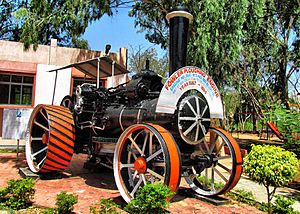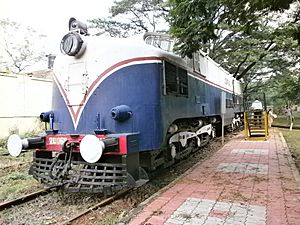Chennai Rail Museum facts for kids
| Lua error in Module:Location_map at line 420: attempt to index field 'wikibase' (a nil value). | |
| Former name | Regional Rail Museum, Chennai |
|---|---|
| Established | 2002 |
| Location | Perambur, Chennai, Tamil Nadu 600 038, India |
| Type | Rail museum |
| Visitors | 7,500 per month |
| Public transit access | Villivakkam railway station, Anna Nagar Tower Park metro station, ICF Bus Stand |
The Chennai Rail Museum is a cool place in Chennai, Tamil Nadu, India. It's a museum all about trains! It first opened on April 16, 2002. You can find it inside the Integral Coach Factory (ICF) near Perambur.
This museum is quite big, covering about 6.25 acres. It has lots of old trains and railway items. You can see many steam engines from the time of the British Raj. There are also special old train coaches, like those used for the Ooty trains. Many of the really old trains were made by the North British Locomotive Company. Some trains here are over 100 years old! You can even take a fun toy-train ride around the museum.
The museum has three indoor galleries that are air-conditioned. These include the ICF Gallery, Rail History Gallery, and Art Gallery. There are also two other galleries that are not air-conditioned. You can watch railway films in a 90-seat movie theater. The museum also features cool metal sculptures made from scrap metal. There's a special 3D mural at the entrance. You can spot cartoon hero characters from the toy train ride. There's even a train coach restaurant and a green park. The ICF manages and takes care of the museum.
Contents
Where is the Museum?
The Chennai Rail Museum is in the Perambur area. This area is famous for the Integral Coach Factory. You can get to the museum by bus. Buses on the 71 series connect the museum to places like Broadway, Chennai Central, Chennai Egmore, Kilpauk, Ambattur, and Avadi.
How the Museum Started
The museum was first called the Regional Rail Museum (RRM). It was set up in March 2002. The Railway Board really wanted this museum to be a good example. They planned to open similar museums in Kolkata and Pune. The idea for the Chennai museum came up in 1993-94. The Railway Minister, Nitish Kumar, officially opened it on March 31, 2002. It welcomed visitors starting April 16.
The museum got its new name, Chennai Rail Museum, on August 22, 2016. This was to celebrate the 377th Madras Day. The museum was updated and a new Art gallery was added. This new part was opened on October 2, 2016.
What You Can See at the Museum
This museum is about 6.5 acres big. It has two main galleries and many old train exhibits outdoors. There's a toy train that takes you around the whole place. There's also a playground for kids.
The indoor galleries show photos from the early days of the ICF and Indian Railways. You can also see small working models of trains. There are rare items from the colonial period, which means from the time when India was ruled by the British. You can also watch a video about the Neal's ball token system. This system helped trains communicate with each other. There's even a special coach where Mahatma Gandhi once traveled.
Outside, you can explore 41 different train models. One cool exhibit is an 1895 Fowler steam ploughing engine. This machine was used for farming. There are also double-deck coaches from the 1860s. You can see a special inspection car (RA 30) and a huge crane called Hercules. This crane was used to help in emergencies. There are also fancy luxury coaches. You can go inside almost all the coaches on display!
As you walk around, you'll see posters of fast trains from all over the world. There's also information about the history of Indian Railways. You can see models of coaches made for countries like Sri Lanka, the Philippines, Vietnam, and Zambia. Other outdoor exhibits include a coach from the Mumbai local train network. There are old railway maps of India and clocks that are a hundred years old. You can also see a big diesel-locomotive engine block. Some life-size models include a Nilgiri Mountain Railway coach and a hospital van.
The museum also has photos of important people who visited the ICF. These include world leaders, kings, and queens. There are model trains that run on three levels. Over 150 photos show the history of ICF and Indian Railways.
The ICF Diamond Jubilee Gallery has old photos that were fixed up. One photo shows a steam-engine turntable. You can also see a first-class train seat. There's a small model of third-class coaches made for Uganda. This gallery also has photos of famous people like Queen Elizabeth II, K. Kamaraj, and Prime Minister Jawaharlal Nehru.
An art gallery has more than a dozen paintings. These paintings show scenes you might see at railway stations. For example, one painting by M. S. Murthy is called Gandhi. It honors Mahatma Gandhi and his ideas. Another painting, Kanhaiya's Journey, shows a young Krishna helping his mother find her way. This painting shows that gods can be found everywhere, not just in temples.
At the museum entrance, there's an old steam engine that used to run in the Nilgiri Mountains. The area around it is decorated with plants and herbs. A walking path lets you get a close look at this antique train.
Visitors to the Museum
The museum was created to show the amazing history of Indian Railways. Work on it started in 2001. The Railway Minister, Nitish Kumar, opened it in March 2002. Since then, many new things have been added. The museum even built a train ride just for children.
About 5,500 people visit the museum every month. Most of them are students and people from the local area. In August 2017, the museum had 14,792 visitors. This was a big jump from 10,809 visitors in August 2016.
Train Coach Restaurant
On August 31, 2018, a special restaurant opened at the museum. It's inside a real train coach! This air-conditioned restaurant is called Chennai Express. It's located inside a Linke Hoffman Busch train coach from the ICF. This was only the second such restaurant in India. The first one opened in Bhopal in 2015. The Chennai Express restaurant serves Chinese, continental, North-Indian, and South-Indian food.
The path to the restaurant looks like a railway platform. The restaurant can seat 64 people. You can sit at tables inside the coach or on the platform. The inside of the coach looks like the fancy Maharajas' Express and the Deccan Odyssey trains. The kitchen is in a shipping container that was changed for this use. Artists painted the outside of the coach.
Museum Theater
The museum also opened a small movie theater on August 15, 2018. It has 90 seats and is air-conditioned. It shows films about the Integral Coach Factory, Indian Railways, and railway history from around the world.
See Also
- National Rail Museum, New Delhi
- Rewari Railway Heritage Museum
- Railway Museum Mysore
- Railway Heritage Centre, Tiruchirappalli
- Joshi's Museum of Miniature Railway
 | Mary Eliza Mahoney |
 | Susie King Taylor |
 | Ida Gray |
 | Eliza Ann Grier |



